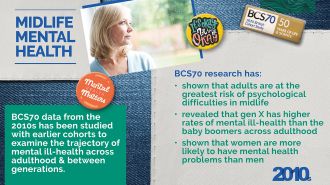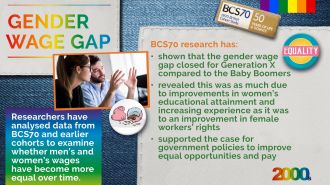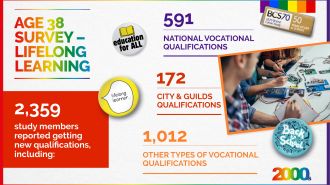- Our studies
- Our research
- Publications and resources
- Data access and training
- About
- News
- Events
- Get in touch
- Join our mailing list
Welcome to our news and blogs section. Here you’ll find the latest developments and insights from across our longitudinal studies.
Growing Up in the 2020s is the country’s first comprehensive long-term study tracking adolescents’ development and educational outcomes following the Covid-19 pandemic.

Data collected from CLS’s four cohort studies will be used to help improve the understanding of the risk factors, symptoms and treatment of the long term effects of COVID-19, in a major new research project announced today.

Information from the NHS about cohort members’ health care and treatment in hospitals has now been linked to two longitudinal cohort studies, which have collected survey data over six decades – the 1958 National Child Development Study (NCDS) and the 1970 British Cohort Study (BCS70).

Celebrating 50 years of the 1970 British Cohort Study – With five decades of invaluable service to British science and society, what has it been like for our 1970 British Cohort Study members to take part in the study? This week we speak to Fiona.

The 1970 British Cohort Study (BCS70) has been an important source of evidence on midlife mental health, helping to improve our understanding about why middle age is such a vulnerable period for adults.

With the whole country in lockdown again, the UCL Centre for Longitudinal Studies (CLS) is conducting another web survey of thousands of cohort study participants, to find out how the COVID-19 pandemic continues to affect the lives of different generations of people in the UK.

During the Age 42 Sweep, study participants were asked to repeat a vocabulary assessment they had previously taken in 1986, at age 16.

Celebrating 50 years of the 1970 British Cohort Study – as we conclude our exploration of BCS70 in the 2000s, we take you on an animated tour from the start of the new millennium.

Baby Boomers and Generation X are at the greatest risk of mental ill-health in middle age, finds new research by UCL.
Several administrative health records have recently been linked to the CLS cohort studies survey data, opening up new possibilities for health researchers. In this webinar, researchers found out what’s included in the linked datasets and how to access them.

This project aims to develop a conceptual and empirical understanding of social isolation across the life course and generate comparable measures across cohorts.

Britain’s birth cohort studies have been some of the leading sources of evidence on women’s education, employment and pay, helping us to monitor and understand the possible factors behind the gender wage gap.

In the Age 38 Sweep, 2,359 people reported getting a new qualification.
Ryan Bradshaw
Senior Communications Officer
Phone: 020 7612 6516
Email: r.bradshaw@ucl.ac.uk